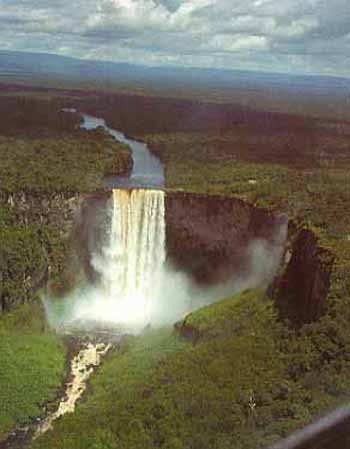
Peace Corps Guyana Program Overview
PEACE CORPS GUYANA PROGRAM OVERVIEW
Historical Perspective
Peace Corps first received a formal invitation from Guyana in 1966, the year of its independence. At that time the Guyanese Government, led by Prime Minister Forbes Burnham, requested Volunteers to serve in education and infrastructure projects. From 1966 until 1971, more than 160 Volunteers served in Guyana with the Peace Corps. Education Volunteers broadened the school curricula to include technical and vocational subjects, including home economics, crafts, and manual arts. Peace Corps/Guyana provided skilled technicians, architects, and engineers to assist in developing and carrying out plans of Guyana's Ministry of Works and Hydraulics. Peace Corps discontinued the Guyana program in 1971 after the Government of Guyana requested all overseas voluntary agencies to leave.
After an absence of nearly a quarter-century, the Guyanese Government, led by President Cheddi Jagan, approached Peace Corps in 1993 about the prospects for Peace Corps' re-entry into Guyana. In March of 1995, Peace Corps officially re-opened a joint Peace Corps Office for Suriname and Guyana. The first Volunteers arrived in 1995 to work in Community Health and Youth Development. During 1997, Peace Corps/Guyana and Peace Corps/Suriname split to form two separate programs, each with its own permanent country staff and programmatic operations. In 1998, Peace Corps/Guyana moved away from Youth Development and into the field of Education and Community Development. Presently, approximately twenty Volunteers arrive in groups twice a year to work in Community Health and Education projects. Those Volunteers serve at sites ranging from the capital city with a population of 300,000 to remote villages with populations of less than 300 and are attached to a variety of schools, non-governmental agencies and government health facilities.
CURRENT PROJECTS
Peace Corps activities in Guyana assist in the efforts to provide community service and health education outreach to targeted populations in collaboration with the relevant Ministries and non-governmental organizations. The goal for the projects is to increase the effectiveness of existing efforts by facilitating community involvement, the training of service providers, and introducing new methodologies.
COMMUNITY HEALTH EDUCATION
Under serious labor constraints, the Ministry of Health in Guyana is attempting to simultaneously strengthen and decentralize the countrys health care system. Depressed wages and salaries, a declining economy, and the flight of skills to more lucrative labor markets have worsened the situation. The Peace Corps Community Health project operates largely at the community level and seeks to support the Ministry of Healths primary health care program. Health Education Volunteers are attached mostly to local health centers and, through collaboration with local staff, seek to address primary health care issues with the public, with a particular focus on HIV/AIDS and maternal and child health. Health Volunteers also work with community leaders, groups, and organizations to facilitate community health assessments, design and implement community projects, and train health center staff and community leaders. Volunteers placed in this sector are challenged to develop innovative ways of taking health education outreach programs to schools, community groups and youth.
EDUCATION AND COMMUNITY DEVELOPMENT
The vast political, social and economical changes present in Guyanas process of nation building place the nations youth, who compromise nearly 60% of the population, at great risk. Past attempts to respond to the developmental needs of youth demonstrate a reliance on institutional approaches that lack linkages to the family, school and community. As a consequence, many of the high risk youths in Guyana face a situation of dependence and lack of control over their situations. The Ministry of Education perceives that Guyanas young people have trouble facing issues such as the establishment and maintenance of healthy relationships, the movement from childhood and adolescence to adulthood, acquisition of education and skills for employment, dealing with peer pressure, managing sexual feelings and desires, domestic violence, and HIV/AIDS and other STDs. Young people must have knowledge, attitudes and skills to successfully meet the challenges of adolescence and young adulthood to contribute positively to their communities. The Peace Corps Education and Community Development project works through local schools to conduct life skills education with local youth. Volunteers work in secondary schools teaching math, science or English and combine this with life skills education to better prepare Guyanas youth for the challenges that they face in adulthood. Another component of this project is Information Technology (IT) education, which begin in 2001 with four Volunteers. There are presently eight volunteers promoting IT in secondary schools, technical institutions, and community based organizations. Volunteers are working as trainers of trainers to increase computer literacy in both the youth and teacher populations.
PEACE CORPS GUYANA STAFF
Country Director ...Earl M. Brown, Jr.
APCD Administration ..James Gultry
APCD Programming . Terrence Simmons
APCD Training .Claudius Prince
Peace Corps Medical Officer ... ..Jean Vyfhuis
11 Support Staff
Revised September 2002
